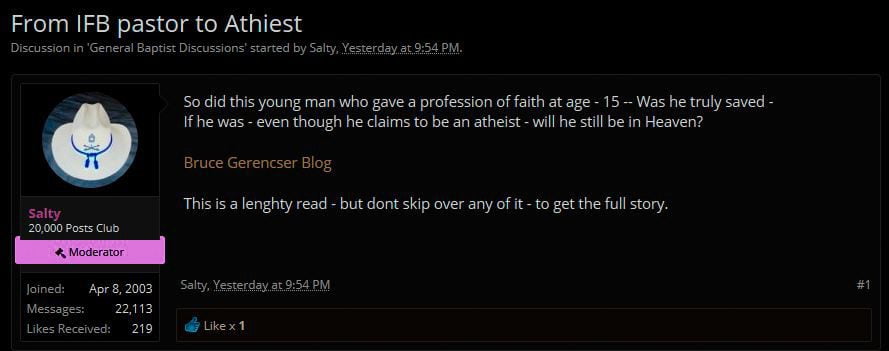
It never ceases to amaze me the places I find my story being cussed, discussed, diagnosed, and deconstructed. The latest discussion is currently going on at the Baptist Board: A Christ Centered Community. The focus of the discussion is whether Bruce Gerencser will go to Heaven when he dies. Baptists, for the most part, believe that once a person is a saved, he is always saved. This doctrine is variously called once-saved, always-saved or eternal security. Calvinists call the doctrine the preservation or perseverance of the saints. The end is the same: a person who repents of his sin and puts his faith and trust in Jesus is eternally saved and Heaven will be his home after he dies. No matter what I do or how I live my life, be it as an adulterer or murderer, when I die angels will carry me into the Christian God’s Heaven.
Some Baptists, unwilling to allow such a miscreant as I into God’s Heaven, take another approach. He NEVER was saved, they say. This argument, by far, is the silliest I have heard over the years. What in my life as a Christian and a pastor points to some sort of fatal defect in my understanding of the gospel? Why shouldn’t my sincere testimony of faith be taken at face value? Can those who say I never was a Christian give any evidence for their claim? Of the thousands of people who heard me preach, called me pastor, or were colleagues of mine, who among them said at the time, Bruce Gerencser is not a Christian? Not one person. My life by any reasonable measurement was one of faith and devotion to Jesus Christ.
Presently, I am an atheist and a humanist. I am quite clear and forthright about how I view the past: I once was saved and now I am lost. Arminian Christians — those who believe a Christian can fall from grace and lose their salvation — have no problem squaring my storyline with their theology. They readily admit that I once was a committed follower of Jesus and now I am not. While on one hand this issue is of no importance — the Christian God is a work of fiction and of human origin — it does matter to me that people accept my story at face value. When Christians give testimony about the when, where, why, and how of God saving them, I believe them. While I certainly think there are psychological, sociological, and cultural reasons for such stories, I do accept at face value that Christians believe their stories to be true (as I did as a Christian for many years). All I ask is that Christians do the same, regardless of whether they can square my storyline with their peculiar theology. It’s my story, and who better to tell it than I?
I hope readers will stop by the Baptist Board and read their discussion. The comment that amused me the most was the one that said, “I think it would be very interesting to sit across the table from him, maybe a different doctrinal take would have yielded different fruit.” I would love to know exactly what “doctrinal take” would have led to a different outcome for me spiritually? Having spent the years from ages fifteen to fifty studying the Bible and reading countless theological tomes, I highly doubt that there is a theological system that I am unfamiliar with. Unlike some of the men on Baptist Board (I know several of them), my theology changed over the years. I began my life as a Christian and a pastor as an Independent Fundamentalist Baptist (IFB). I left the IFB church movement in the late 1980s, spending the next decade in Sovereign Grace and Reformed Baptist circles. In the late 1990s, my theological (and political and social) beliefs began to creep leftward, finally finding a home in Emergent/Emerging/Red-letter Christian circles. When I left the ministry in 2005, my theological views were such that I no longer considered myself an Evangelical. In the three years between leaving the ministry and walking away from Christianity, I committed myself to seeking out a Christianity that mattered. During this time, Polly and I, along with three of our children, attended over one hundred churches. You can see the list of churches we attended here. I concluded after three years that Christian churches are all pretty much the same — social clubs that exist for the benefit of their members. Regardless of their ecclesiology, soteriology, and liturgy, churches are pretty much like hamburger joints: McDonald’s, Wendy’s, Burger King, Sonic, Carl’s Jr, or Five Guys. The way the hamburgers are cooked and with what condiments they are served with vary from chain to chain, but one thing remains the same: a hamburger is a hamburger. So it is with Christians and the churches they attend. No matter how special they think their church is, once the bun and condiments are removed, what’s left is a 1/4-1/3 pound round hamburger. Except for Wendy’s, that is. Perhaps they are the One True Hamburger Joint®.
I certainly wouldn’t mind there being life after death — that is, as long as it is not the Evangelical version of heavenly bliss. I have no interest in spending eternity praising and worshiping the Christian God. Now, if Heaven is a pain-free version of the present, beam me up Scotty, I’m ready to go. However, if Heaven is as Evangelicals say it is, count me out. This life is enough. Live for today, for tomorrow we die. And then? Nothing.
Bruce Gerencser, 68, lives in rural Northwest Ohio with his wife of 47 years. He and his wife have six grown children and sixteen grandchildren. Bruce pastored Evangelical churches for twenty-five years in Ohio, Texas, and Michigan. Bruce left the ministry in 2005, and in 2008 he left Christianity. Bruce is now a humanist and an atheist.
Your comments are welcome and appreciated. All first-time comments are moderated. Please read the commenting rules before commenting.
You can email Bruce via the Contact Form.

